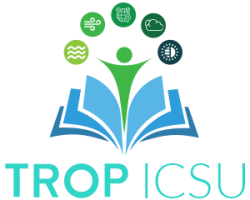Analyzing Climate Science Data through Simple Statistical Techniques

Analyzing Climate Science Data through Simple Statistical Techniques Teaching Module A teaching module that demonstrates the use of linear and quadratic regression to analyze Arctic sea ice extent data and the use of graphs, sample correlations, and multiple regression to analyze atmospheric CO2 level data, solar irradiance data, and average global temperature data. In the […]
Glaciers as Indicators of Climate Change

Glaciers as Indicators of Climate Change Reading A reading that introduces the topic of glaciers and their formation. Students will read about the formation of glaciers, common glacial features, and changes in the extent of glaciers over the past 750,000 years. They will also discuss how glaciers may serve as indicators of climate change. Use […]
Melting Ice Sheets and Sea Level

Melting Ice Sheets and Sea Level Model/Simulation An interactive Model/Simulation to explore the effects of melting ice sheets and the resulting sea level rise on coastal areas. Students will configure parameters related to glacial melt in Antarctica and/or Greenland, and will observe the effects of sea level rise on selected coastal regions in the U.S. […]
Glacial Retreat in Glacier National Park

Glacial Retreat in Glacier National Park Classroom/Laboratory Activity A classroom/laboratory activity that introduces the relationship between climate and the cryosphere, explains how sea-level rise can be predicted (based on average global temperature change), and triggers a discussion on the potential impacts of sea-level rise. In this activity, students will examine actual data for projected sea-level […]
Orbital Forcing and Earth’s Climate

Orbital Forcing and Earth’s Climate Teaching Module A set of classroom/laboratory activities to reconstruct Earth’s past climate using isotopic composition data from ice cores and to highlight the influence of orbital forcing and atmospheric carbon dioxide feedback on Earth’s climate. Students will reconstruct Earth’s past temperatures by plotting graphs of isotopic compositions from ice cores […]
Feedback Mechanisms

Feedback Mechanisms Teaching Module A teaching module titled ‘Feedback mechanisms’ from the e-learning course titled ‘Earth in the Future’ developed by Timothy Bralower and David Bice, The Pennsylvania State University. This module discusses the various feedback mechanisms and is listed in Module 3: Earth’s Climate System of the e-learning course. This overview reading can be […]
How Yukon glaciers are responding to climate change

How Yukon glaciers are responding to climate change Audio This audio podcast discusses how glaciers in the Yukon are responding to climate change. It focuses on changes in the physical characteristics of these glaciers and several methods used by glaciologists to track changes due to climate and weather. About Tool Tool Name How Yukon glaciers […]
Glaciers and Climate Change

Glaciers and Climate Change Model/Simulation An interactive Model/Simulation to explore the effects of melting ice sheets and the resulting sea level rise on coastal areas. Students will configure parameters related to glacial melt in Antarctica and/or Greenland, and will observe the effects of sea level rise on selected coastal regions in the U.S. Use this […]
If Global Temperature Rises by 4 C

If Global Temperature Rises by 4℃ Model/Simulation An interactive Model/Simulation to observe the effects of a global temperature increase of 4°C on human health, agriculture, forests, oceans and marine ecosystems, permafrost, water availability, and extreme climate events. Students will observe and discuss how a global temperature rise of 4°C will affect different regions in the […]
Climate and the Hydrosphere

Climate and the Hydrosphere Reading Module A short reading by the University Corporation for Atmospheric Research (UCAR), Center for Science Education that summarizes the hydrosphere and its role in determining the climate of planet Earth. This overview reading can be used as an introduction to the topic by teachers interested in teaching about climate change […]


